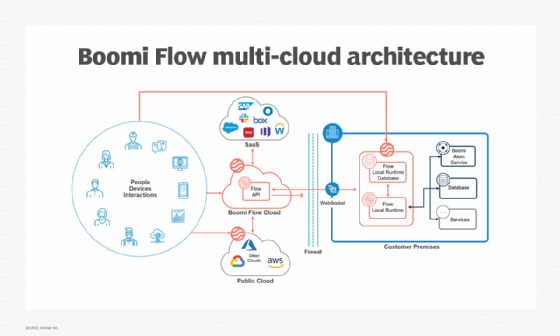
vectorfusionart - stock.adobe.co
Boomi Flow adds support for multi-cloud, hybrid deployments
Dell's Boomi subsidiary expands the deployment options for its low-code Flow workflow automation tool to public clouds and customers' on-premises data centers.
Dell Technologies' Boomi subsidiary extended support to multi-cloud and hybrid cloud deployments with Flow, a tool that customers use to create and automate workflows and applications.
Boomi sells the Flow workflow automation service as a discrete product and as part of its cloud-based AtomSphere enterprise integration platform as a service (iPaaS). AtomSphere helps customers build new applications by connecting data, processes and existing applications in a drag-and-drop fashion rather than manually writing code.
Boomi refers to Flow as a low-code rather than no-code tool because users have the option to customize the look and feel of applications with their own components. But Manoj Gujarathi, the company's director of product management, said the buttons, drop-down menus and other prebuilt code that Boomi provides with the Flow tool suffice for most standard application building without the need to write any code.
With the new product release, customers will be able to deploy the applications and workflows they build using Flow in the public cloud of their choice or on premises, behind a firewall. In the past, Flow applications could run and operate only in Boomi's cloud.

Containers facilitate multi-cloud and hybrid cloud capabilities
To enable the multi-cloud and hybrid cloud capabilities, Boomi bundles together the application code, the Flow runtime engine, infrastructure and associated libraries into a Docker container that customers can deploy on premises or in any cloud and manage using Kubernetes or other container orchestration technologies, Gujarathi said.
Gujarathi said customers had been asking for the flexibility to run their applications wherever they want for purposes such as security, regulatory compliance and data control. He said many also want to control the scale of their deployment infrastructure.
Doug Henschen, a vice president and principal analyst at Constellation Research, said it was important for Boomi to add multi-cloud and hybrid cloud deployment options to Flow to give customers a consistent experience across the company's product suite. Boomi already supported multi-cloud capabilities in its Integration, API Management, B2B/EDI Management and Connectivity components.
Henschen expects the multi-cloud and hybrid cloud support will also be a draw for prospective customers that want to start with workflow automation. He said he has seen increasing interest in workflow and automation across all industries, as companies try to stitch together and streamline end-to-end tasks and automate repetitive, formerly manual tasks wherever possible.
Flow targets citizen developers
David Mooter, a senior analyst at Forrester Research, said the Flow tool also fits well with the growing interest in "citizen development tools" for users who don't have IT backgrounds. He said the pandemic increased the demand for IT to produce touchless digital experiences at a time when the U.S. continues to suffer from an IT labor shortage. Citizen development tools could help organizations to deliver more services with non-IT staffers taking on some of the work, he said.
The Boomi Flow user base extends from professional developers to line-of-business users such as project managers and analysts, according to Gujarathi. He said Flow becomes even more useful when used in combination with Boomi's Connectivity or Integration components to connect to data sources and bring up or push out data.
Customers can buy Boomi Flow as a discrete tool or with the full AtomSphere iPaaS suite, just as they can with the Integration, Connectivity, Master Data Hub, B2B/EDI Management, API Management, and Data Catalog and Preparation components.
The cost of the individual Boomi services varies. For instance, pricing for the most popular Integration services hinges on the number of connections a customer uses. Gujarathi said Boomi charges for Flow based on the number of applications or workflows a customer builds. Flow's new multi-cloud and hybrid cloud are available at no extra fee to enterprise license holders.
Boomi introduced the cloud-based Flow workflow automation service in 2017 after completing its acquisition of San Francisco-based startup ManyWho. Boomi was also an acquisition. Dell bought the company in 2010 to give customers an easier way to integrate and transfer data between cloud and on-premises legacy applications.
Enterprise iPaaS leaders in Gartner's Magic Quadrant include Boomi, Informatica, Jitterbit, Microsoft, Salesforce's MuleSoft, Oracle, SAP, SnapLogic and Workato.
Carol Sliwa has been a TechTarget senior writer since 2008. Her coverage area includes enterprise architecture, flash, memory and storage drive technology.







